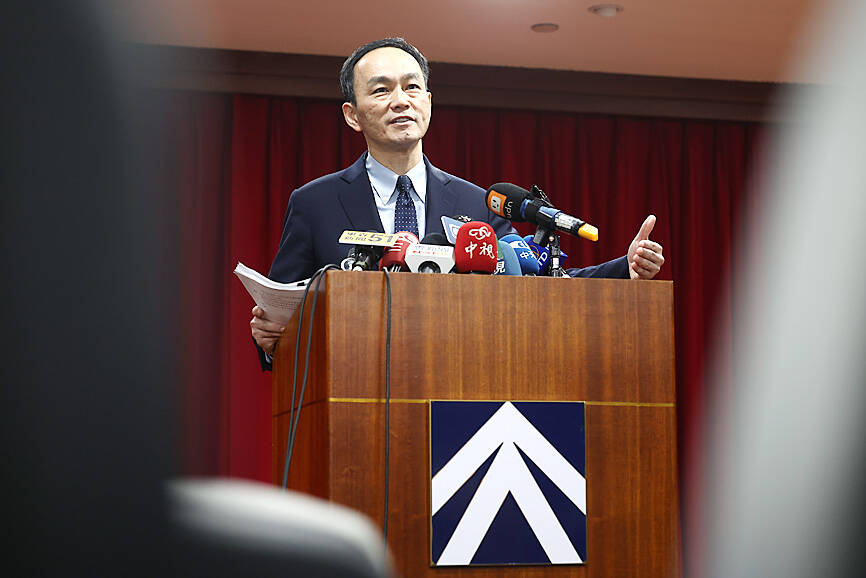Uber Technologies Inc’s plan to acquire Delivery Hero SE’s local Foodpanda business for US$950 million has been rejected, the Fair Trade Commission (FTC) said yesterday, citing anti-competitive concerns.
UberEats had aimed to complete the all-cash deal by the first half of next year. The acquisition would have been one of Taiwan’s largest outside of the chip industry, marking a retreat for Delivery Hero from Asia.
However, the commission earlier this month indicated that it had concerns about the planned deal.

Photo: CNA
The Ministry of Labor in October notified the commission of its opposition to UberEats’ proposed acquisition of rival service Foodpanda in Taiwan.
Uber and Delivery Hero had previously said that the takeover was contingent on regulatory approval. They are the two dominant players in the market.
UberEats yesterday expressed its disappointment with the commission’s decision, as it firmly believed that the transaction — if it had gone through — could bring the greatest benefits to its delivery partners, merchant partners, consumers and Taiwan’s economy.
It had maintained good communications with the FTC since it first announced its acquisition plan in May and had made proposals with multiple conditions attached, hoping to address the regulators’ concerns, UberEats said in a statement.
Despite the setback, the company would continue to invest in the nation and bring innovation, as Taiwan is still among the global markets with the greatest growth and is full of food delivery business opportunities, it said.
The National Delivery Industrial Union yesterday welcomed the commission’s rejection of the planned deal, saying it was right to prevent the food delivery industry from falling into the hands of one business group.
Union spokesman Su Po-hao (蘇柏豪) told reporters that food delivery platforms have been in Taiwan for more than 10 years, but benefits and security for delivery workers have declined each year, while customers are constantly being charged extra fees, and merchants face ever-increasing commissions and advertising fees.
Against this backdrop, if the merger of UberEats and Foodpanda had been approved, it would have been a lose-lose situation for the industry and consumers, Su said.
This is the second big takeover stopped by Taiwanese regulators recently.
In September, the FSC rejected CTBC Financial Holding Co’s (中信金控) multibillion-dollar bid for smaller rival Shin Kong Financial Holding Co (新光金控).

ACTION PLAN: Taiwan would expand procurement from the US and encourage more companies to invest in the US to deepen bilateral cooperation, Lai said The government would not impose reciprocal tariffs in retaliation against US levies, President William Lai (賴清德) said yesterday, as he announced five strategies to address the issue, including pledging to increase Taiwanese companies’ investments in the US. Lai has in the past few days met with administrative and national security officials, as well as representatives from various industries, to explore countermeasures after US President Donald Trump on Wednesday last week announced a 32 percent duty on Taiwanese imports. In a video released yesterday evening, Lai said that Taiwan would not retaliate against the US with higher tariffs and Taiwanese companies’ commitments to

Intelligence agents have recorded 510,000 instances of “controversial information” being spread online by the Chinese Communist Party (CCP) so far this year, the National Security Bureau (NSB) said in a report yesterday, as it warned of artificial intelligence (AI) being employed to generate destabilizing misinformation. The bureau submitted a written report to the Legislative Yuan in preparation for National Security Bureau Director-General Tsai Ming-yen’s (蔡明彥) appearance before the Foreign Affairs and National Defense Committee today. The CCP has been using cognitive warfare to divide Taiwanese society by commenting on controversial issues such as Taiwan Semiconductor Manufacturing Co’s (TSMC, 台積電) investments in the

HELPING HAND: The steering committee of the National Stabilization Fund is expected to hold a meeting to discuss how and when to utilize the fund to help buffer the sell-off The TAIEX plunged 2,065.87 points, or 9.7 percent, to close at 19,232.35 yesterday, the highest single-day percentage loss on record, as investors braced for US President Donald Trump’s tariffs after an extended holiday weekend. Amid the pessimistic atmosphere, 945 listed companies led by large-cap stocks — including Taiwan Semiconductor Manufacturing Co (TSMC, 台積電), Hon Hai Precision Industry Co (鴻海精密) and Largan Precision Co (大立光) — fell by the daily maximum of 10 percent at the close, Taiwan Stock Exchange data showed. The number of listed companies ending limit-down set a new record, the exchange said. The TAIEX plunged by daily maxiumu in just

‘COMPREHENSIVE PLAN’: Lin Chia-lung said that the government was ready to talk about a variety of issues, including investment in and purchases from the US The National Stabilization Fund (NSF) yesterday announced that it would step in to staunch stock market losses for the ninth time in the nation’s history. An NSF board meeting, originally scheduled for Monday next week, was moved to yesterday after stocks plummeted in the wake of US President Donald Trump’s announcement of 32 percent tariffs on Taiwan on Wednesday last week. Board members voted to support the stock market with the NT$500 billion (US$15.15 billion) fund, with injections of funds to begin as soon as today. The NSF in 2000 injected NT$120 billion to stabilize stocks, the most ever. The lowest amount it